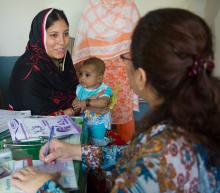
With thanks to Fikre Keith and colleagues at K4Health, where this blog is also published here
“[Family planning] guidelines might be outdated, not available or the providers might not adhere to the instructions in the guidelines. They might also lack training/mentoring to equip them with updated skills, knowledge and attitude which would have limited or prevented bias.” (Challenges family planning providers may encounter, reported by Olajumoke Onalopo, Netherlands)
Part of the HIFA Project on Family Planning and Contraception includes hosting thematic discussions on the HIFA email forum. Our first exchange, held throughout September-November 2017, addressed family planning myths and misconceptions . This time, we looked at ways to support family planning providers. We started by asking, "Just who are they?"
If asked, most people would probably respond that it’s “doctors and nurses” who provide family planning (FP) services. The second HIFA thematic discussion on family planning challenges this view and looks at the many different types of family planning providers and their needs. We learn that “those who provide FP advice and services are a complex, diverse group” (Sarah Harlan, USA).
We find that pharmacists, midwives, community health workers, and even family, friends, and religious leaders can play an enormous role as family planning implementers. In countries where access to highly trained health workers may be difficult, it is critical that we assess these roles. For example, people who work in drug shops or pharmacies can be pertinent to FP implementation. Peggy D’Adamo (USA) writes, “With the right training and support, pharmacy and drug-shop staff can facilitate the use of modern contraception, especially in urban slums and rural areas where the unmet need is high, access is poor, and health worker shortages and other barriers prevent people from accessing family planning services.” Beneficial training and support may also help “reduce corruption and encourage good accountability within the system,” according to Gwewasang Martin (Cameroon).
Although there are diverse cadres of family planning providers, access may be constrained by personal and societal views. There is a critical need to ensure that socio-cultural norms are not acting as barriers to receiving FP services. Shabina Hussain (USA) states, “It is essential to sensitize providers about their role as 'healthy society preservers/creators' rather than the upholders of morality prevalent in their culture or society.” Hussain experienced her own colleagues refusing family planning services to women who did not obtain parental or spousal consent. Withholding services in order to gain consent may mean choosing between life or death for many. Ede Michael (Nigeria) informs us of his experiences with the belittling attitudes of various health workers when youth made requests for contraceptives.
When it comes to laying the foundation for establishing guidelines or trainings, Sarah Harlan writes, “we should always be asking ourselves, 'What do health workers know? What (do) they want to know? And what information would empower them to serve their clients more effectively?'” Karah Pedersen (USA) believes that it is critical that health workers are “trained and sensitized” to support the needs and concerns of youth. There needs to be an “integration of adolescent-friendly services into existing family planning services and existing SRH services to respond to the specific needs of adolescents, which includes how to best interpret and address country-specific medical guidelines and policies related to consent to services and confidentiality.” However, from Marthe Zeldenrust’s (Netherlands) experience, good guidelines may only exist on paper and not in practice. While working in an obstetric department in rural South Africa, she found issues of overcrowding in postnatal wards, a lack of prioritization for FP clients, and religious beliefs causing hesitation in doctors—even though family planning guidelines appeared to be in place.
In addition, health care workers need to have FP methods available for distribution. If clinics have repeated shortages of supplies, how can health workers effectively provide adequate methods? Amy Oggel (USA) discusses challenges that small nonprofit clinics may endure in terms of buying power: “Being able to stock a sufficient quantity and variety of FP methods ensures that these clinics maintain their competitive edge and are able to give clients their choice of FP method.”
A plethora of resources were also shared during this forum, including Knowledge for Health Toolkits, WHO’s publication on Monitoring human rights in contraceptive services programmes , the CIRHT monthly news review , and even FP counseling lecture materials.
This thematic discussion highlights just who our family planning implementers are, challenges they face, and how we can work to make sure they receive the support they need. It’s time to ensure all FP providers are able to work without constraints to provide the 214 million women who want to avoid pregnancy but are not using modern contraceptive methods access to this basic human right.
Do you want to participate in these conversations, share your insights, and learn from colleagues in the field of global family planning? Join HIFA today!
Picture credit: At a Basic Health Unit in Punjab Province, Pakistan, 23-year-old Tahira Rashid receives counseling by Dr. Fauzia Amin, a female medical officer. © 2012 Derek Brown/USAID, Courtesy of Photoshare

